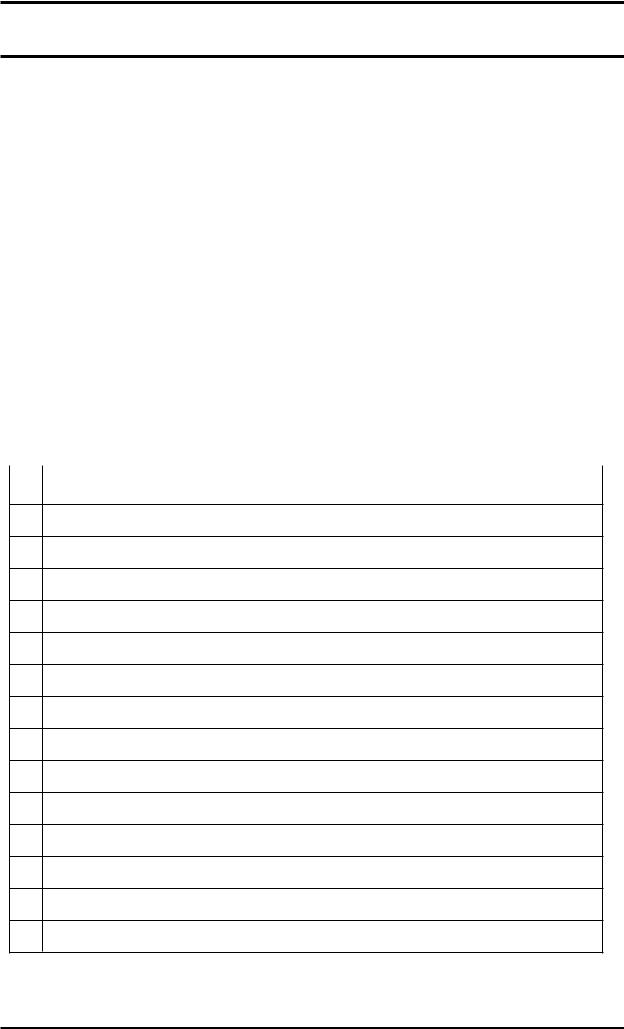
L.E.english_vocabulary_for_law
.pdf
TypesUnit 0000of court
Exercise 1:
Complete definitions 1 – 18 with words / expressions from the box. Note that several of these are related to British or English and Welsh law only, although other countries will usually have an equivalent.
Admiralty Court |
employment tribunal |
Commercial Court |
European Court of Human Rights |
coroner’s court |
European Court of Justice |
County Court |
High Court |
courthouse |
House of Lords |
court-martial |
Lands Tribunal |
Court of Appeal |
magistrates' court |
Court of Protection |
rent tribunal |
Crown Court |
small claims court |
|
|
1.A _______________ is a court that deals with disputes over small amounts of money.
2.A _______________ is a civil or criminal court to which a person may go to ask for an award or sentence to be changed.
3.A _______________ is a court which tries someone serving in the armed forces for offences against military discipline.
4.A ______________ is the general word for a building in which trials take place.
5.A _______________ is one of the types of court in England and Wales which hears local civil cases.
6.The _______________ is a court which considers the rights of citizens of states which are parties to the European Convention for the Protection of Human Rights.
7.An _______________ is a body responsible for hearing work-related complaints as specified by statute.
8.A _______________ is a court which hears cases of petty crime, adoption, affiliation, maintenance and violence in the home (= domestic violence), and which can also commit someone for trial or sentencing in a Crown Court.
9.A _______________ is a court presided over by a public official (usually a doctor or lawyer) who investigates sudden, unexpected and violent deaths.
10.A _______________ is a court above the level of a magistrates' court which hears criminal cases.
11.A _______________ is a court which deals with compensation claims relating to land.
12.A _______________ is a court in the Queen's Bench Division (= one of the main divisions of the High Court) which hears cases relating to business disputes.
56
For reference see Dictionary of Law 4th edition (A & C Black 0-7475-6636-4).

Unit 0000
13.A _______________ is a court which adjudicates in disputes about money paid or services provided in return for borrowing something – usually buildings or land.
14.The _______________ is the main civil court in England and Wales.
15.The _______________ is the court set up to see that the principles of law as laid out in the Treaty of Rome are observed and applied correctly in the European Union.
16.A _______________ is a court appointed to serve the interests of people who are not capable of dealing with their own affairs, such as patients who are mentally ill.
17.The _______________ is court which is part of the Queen's Bench Division (see number 12 above), which decides in disputes involving ships.
18.The _______________ is the highest court of appeal in the United Kingdom (although appellants unhappy with a decision made here can appeal to the European Court of Justice).
Exercise 2:
Decide which of the courts above is most likely to deal with the following situations.
1.HMS Decrepit and HMS Leaky collide during exercises in the North Sea. The captains of both vessels blame each other.
2.Mr Johnson and Mrs Johnson are getting divorced. Mrs Johnson demands to have the house, the car, 75% of Mr Johnson's life savings and their pet cat, Tigger. "No way!" says an angry Mr Johnson.
3.One evening, Mr Waring goes to his favourite seafood restaurant for dinner. The next morning he is found dead in bed.
4.Two separate companies, English International Telecommunications and Britphone, both bring out a new mobile phone which they call the 'Smell-O-Phone'. Both companies claim that the name was their own idea.
5.Five workers have been sacked from the computer manufacturing company 'Compucrash' for incompetence. They believe that they have been unfairly dismissed.
6.Mr Cassington is 98 years old and going deaf and senile. The local Social Services believe he should be put in a special home. Mr Cassington refuses to leave his own house.
7.Mr and Mrs Waugh had a new window installed in their house. The window company now wants the Waughs to pay, but Mr Waugh is refusing because he thinks the quality of workmanship is poor.
8.Jamie Yarnton pays £500 a month to live in Mrs Witney's house. Suddenly, Mrs Witney asks him for £1,000 a month instead. Mr Yarnton thinks this is completely unreasonable.
9.Newspaper editor Mr Hislop publishes an article describing the Prime Minister as a 'useless, incompetent fool who can barely tie his own shoelaces, let alone run the country'. The PM decides to take immediate legal action against the paper.
10.Corporal Jones ignored Sergeant Wilson's orders, then went 'absent without leave' for two weeks.
57
For reference see Dictionary of Law 4th edition (A & C Black 0-7475-6636-4).

WillsUnit 0000
Complete definitions and explanations 1 – 15 below with words and expressions from the box.
administrator |
benefactor |
beneficiary |
codicil |
deceased |
dependants |
|||||
estate |
executor |
inherit |
inheritance |
|
intestate |
living wills |
of age |
|||
of sound mind |
power of attorney |
probate |
testament |
trust |
trustee |
|||||
|
|
|
|
|
|
|
|
|
|
|
1.A will is often also known in legal terms as a last will and ________.
2.When someone makes a will, they must be ________ (in other words, they must be mentally healthy), and must be ________(ie, over 18 in Britain)
3.When a person is making a will, their first concern is usually for their ________ (the people who he / she supports financially, for example, his / her children).
4.A person who has died recently is often referred to as the ________.
5.Someone who dies without making a will is said to have died ________.
6.________ is the legal acceptance that a document, and especially a will, is valid.
7.If a person dies without making a will, a person known as an _______ might be appointed by a court to represent the deceased.
8.A ________ is a document which makes a change or an addition to a will.
9.A person who is appointed by a person making his / her will to make sure that the terms of the will are carried out is called an ________.
10.A person who gives property or money to others in a will is called a ________, and the person who is left money or property in a will is called a ________.
11.The money and property that is owned by a person, especially someone who has died, is known as an ________.
12.________ is a verb which means 'to acquire something from a person who has died'. The property which is received is called an ________.
13.Money or property which is looked after for someone by someone else (for example, money which has been left in a will that someone will receive when they reach a particular age) is called a
________. The person who looks after this money is called a ________.
14.People who are seriously ill often appoint someone to deal with their affairs for them. This is called
________.
15.Many people now write special healthcare directives called ________, which indicate how they want to be treated if they become seriously ill.
58
For reference see Dictionary of Law 4th edition (A & C Black 0-7475-6636-4).

Word associationUnit00001
Complete each gap below with one word that can be used with the words and expressions in italics. All of these words, when used together with the italicised words, are connected directly or indirectly with different aspects of law (criminal, business, commercial, property, etc). The first letter of each word is already there for you, the function of each word is explained in brackets after each gap, and the first one has been done as an example.
1.This a____ (adjective) can come before discharge, majority, monopoly, privilege, right and title. (Answer = absolute)
2.This a____ (verb / noun) can come before the words your authority, of power, of process and of human rights.
3.This a____ (noun) can come before the expressions in personam, in rem and in tort, and after the expression to take legal.
4.This a____ (adjective) can come before outcome, party, possession and witness.
5.This a____ (noun) can come before agreement, award, board and clause, and also after the expressions to submit a dispute to, to refer a question to, to take a dispute to and to go to.
6.This b____ (noun) can come before the expressions of confidence, of contract, of promise, of the peace, of trust and of warranty, and between the prepositions in + of.
7.This c____ (noun) can come before allowance, assets, crime, expenditure, gains, goods, levy, loss and punishment, and in the expression to make political ___ out of something.
8.This c____ (noun) can come before the expressions of approval, of deposit, of incorporation, of judgement, of origin, of registration, of registry and of service.
9.This c____ (adjective) can come before the words action, court, disobedience, disorder, law, liberties, rights and strife.
10.This c____ (adjective) can come before the words assault, carrier, land, law, ownership, position, pricing and seal, and after the expression tenancy in.
11.This c____ (noun) can come before the words fund, order, and package, and before the expressions for damage, for loss of office and for loss of earnings.
12.This c____ (noun) can come before the words confidence, council, credit, goods, group, legislation and protection.
13.This c____ (noun) can come before the words law, note and work, before the expressions of employment, of service and under seal, after the word under, and after the expressions by private and to void a.
14.This c____ (noun) can come before the words action, case and order, before the expressions of appeal, of first instance, of last resort and of law, after the words open, criminal and civil, and after the expressions out of and to take someone to.
15.This c____ (noun) can come before the words act, action, bankruptcy, court, damage, law, libel, negligence, offence, record and responsibility, and after the words hardened and habitual.
59
For reference see Dictionary of Law 4th edition (A & C Black 0-7475-6636-4).

Unit 0000
16.This c____ (noun) can come before the words barrier, clearance, declaration, duty, examination, formalities, officer, seal, tariffs and union, before the expression and Excise, and after the expression to go through.
17.This d____ (noun) can come before the words counsel, statement and witness, before the expression before claim and after the expression to file a.
18.This d____ (noun) can come before the words abuse, addict, addiction, baron, czar, dealer, runner, squad and trafficking, and after the classification expressions Class A, Class B and Class C.
19.This f____ (adjective) can come before the words conveyance, misrepresentation, preference, trading and transaction.
20.This f____ (noun) can come before the expressions of assembly, of association, of information, of movement, of speech, of the press and of thought, conscience and religion.
21.This i____ (noun) can come before the words documents, papers, parade and theft, after the word false, and after the expressions to change your, to be asked for proof of and a case of mistaken.
22.This i____ (adjective) can be used before the words contract, malice, term and trust, and before the expression terms and conditions.
23.This i____ (adjective) can be used before the words accident, development, dispute, espionage, injury, property, relations and tribunal, and before the expression arbitration tribunal.
24.This j____ (adjective) can be used before the words account, beneficiary, committee, discussions, heir, liability, management, owner, ownership, signatory, tenancy and tortfeasors, and before the expressions and several, and several liability and commission of inquiry.
25.This j____ (noun) can be used before the words creditor, debtor and summons, before the expression by default, after the expressions to pronounce, to enter and to take, and in the expression to give your …on something.
26.This j____ (adjective) can come before the words immunity, notice, precedent, processes, review and separation. In Britain, it can come before the expressions Committee of the House of Lords and Committee of the Privy Council.
27.This j____ (noun) can come before the words box, room, service and vetting, after the expression foreman of the, and in the expression to be called for … service.
28.This l____ (noun) can come before the expressions before action, of acknowledgement, of allotment, of application, of appointment, of attorney, of complaint, of credit, of demand, of indemnity, of intent, of reference, of renunciation and of request.
29.This l____ (adjective) can come before the words liability, market, partner, partnership and warranty, and before the expression liability company.
30.This n____ (adjective) can come before the words earnings, estate, gain, price, profit, result and worth.
60
For reference see Dictionary of Law 4th edition (A & C Black 0-7475-6636-4).

Word associationUnit00002
How many of the words and expressions in the box can you match with words 1 – 15 in the table to make complete expressions? The first one has been done for you. Note that some of the words / expressions in the box can be matched with more than one word in the table.
|
…account …action …agent …allowances …assets |
…authority |
…bail |
…channels |
||||||||||||||||
|
…chattels …client …company …conduct …constable …copy |
…court |
…credit |
|||||||||||||||||
|
|
…damages |
…defect |
…deposits |
|
…detective |
…directions |
…discussion |
…effects |
|||||||||||
…-ended …estate …examiner …force |
…hearing |
…holder |
…income |
…indorsement |
||||||||||||||||
|
|
…injury |
|
…inquiries |
…inspector |
…investigation |
|
…land |
…law |
…mediator |
||||||||||
|
|
…nuisance |
...number …of abode |
|
…of advancement |
|
…of affairs |
…of allegiance |
||||||||||||
|
…of allocation |
…of amends |
…of appeal |
…of appointment |
…of attorney |
…of audience |
||||||||||||||
|
…of case |
…of claim |
…of dishonour |
of establishment |
…office |
…officer |
|
…of motion |
||||||||||||
|
…of opposition |
…of re-entry |
...of reply |
…of search |
…of service |
…of silence |
…of truth |
|||||||||||||
|
…of value |
…of way …ownership |
…pending |
…politics |
|
price… …prison |
…property |
|||||||||||||
|
|
…proprietor …prosecution …protection …Receiver ...referee …reference |
||||||||||||||||||
|
|
…representative |
…return |
…rights |
…ruling |
…secret |
…Solicitor |
…specification |
||||||||||||
|
|
to administer an… |
to be open for… |
to be open to… |
|
to be under… |
…to buy |
|||||||||||||
|
|
to make a… |
to make a false… |
|
…to quit |
to register a… …to reside |
…to sell |
|||||||||||||
|
|
|
|
|
to take the… |
…trade mark |
…user |
|
…verdict |
|
|
|
|
|
||||||
|
|
|
|
|||||||||||||||||
|
|
|
|
|
|
|
|
|
|
|
|
|
|
|
|
|
|
|
|
|
1 |
|
notice: notice of allocation, notice of appeal, notice of dishonour, notice of motion, notice of |
|
|
||||||||||||||||
|
opposition, notice of service, notice to quit |
|
|
|
|
|
|
|
|
|
|
|||||||||
|
|
|
|
|
|
|
|
|
|
|
|
|||||||||
|
|
|
|
|
|
|
|
|
|
|
|
|
|
|
|
|
|
|
|
|
oath:
2
offer:
3
official:
4
open:
5
patent:
6
personal:
7
police:
8
power:
9
preliminary:
10
private:
11
registered:
12
right:
13
special:
14
statement:
15
Can you explain what each of these expressions means? If you are not sure, refer to the A & C Black Dictionary of Law, where you will find concise definitions of each one.
61
For reference see Dictionary of Law 4th edition (A & C Black 0-7475-6636-4).

WordUnit 0000association 3
Complete the following sentences and definitions with words that work (collocate) with the other words and expressions in bold. These all use law or legal. Where a sample sentence is given, the definition is in italics at the end of the sentence. Use your answers to complete the crossword on the next page. To make it more challenging for you, there are no numbers in the crossword grid, and the sentences below are in no particular order. However, we have included the first letter of each word in the grid.
1._____ Law is one of the most popular subjects on this course. (laws relating to agreements)
2.The company promised to act _____ the law. (obey the laws of a country)
3.Insider dealing is _____ the law. (not according to the laws of a country)
4.You are _____ the law if you try to export goods without a licence. (to do something that is not legal)
5.Following the assassination of the President, there was a breakdown of law and _____. (a situation where the law is being obeyed by most people)
6.Most people in this country are law-_____, although there are always a few exceptions. (respectful of the law, obeying it)
7.For some reason, some people seem to think they are _____ the law. (do not have to obey the law)
8.There are two sources of law in Britain: the laws that are made in Parliament, and _____ law. (law established n the basis of decisions by the court rather than by statute)
9.The manager laid _____ the law, and threatened to dismiss anyone who broke the regulations. (tell someone strongly and often in an angry way what they should do: an informal expression)
10.Some people take the law into their own _____ because they do not believe the judicial system works effectively. (to punish someone yourself without using the proper legal process: an informal expression)
11.Anyone who wants to run a successful business is advised to learn about _____ law. (law regarding the conduct of businesses)
12.Law _____ is the activity of making sure that laws are obeyed.
13.Any action which is permitted by the law is known as a lawful _____.
14.I've lived with my partner for about 10 years, so that makes her my _____-law wife. (somebody who lives with another person as a wife, although they are not legally married)
15.The branch of law dealing with the rights of ownership is call _____ law.
16.Law of _____ is the law relating to how property shall pass to others when the owner dies.
17.The continuing process of revising laws to make then better suited to the needs of society is called law _____.
18.When his uncle died, Alan made a legal _____ on his property. (a statement that someone owns something legally)
62
For reference see Dictionary of Law 4th edition (A & C Black 0-7475-6636-4).

Unit 0000
19.When he broke the contract, the company started legal _____ against him. (to sue someone, to take them to court)
20.Some people are reluctant to hire a lawyer because they can't afford the legal _____. (the money spent on fees to lawyers)
21.The office employees seven solicitors and a legal _____. (a clerk in a solicitor's office who is not a solicitor and is nor articled to become one, but has passed certain exams)
22.In some countries, people who cannot afford a lawyer may be entitled to legal _____. (money that a government gives to someone to help them pay for a lawyer)
23.Sterling is the only legal _____ in the United Kingdom, although some larger establishments will accept US dollars and the euro. (money that can officially be used in a country)
24.Mr and Mrs Thomas have been granted a legal _____. (a court decree acknowledging that a married couple no longer live together but are not yet divorced)
25.These papers are valid in your country, but unfortunately they have no legal _____ here. (the official legal position of a person, company, document, etc)
|
|
|
|
|
A |
|
|
|
|
C |
|
|
|
|
|
|
|
|
|
|
|
|
|
|
|
|
|
|
|
|
|
|
|
|
|
|
|
|
|
|
|
|
R |
|
|
|
|
|
|
S |
|
|
|
|
|
|
|
|
|
|
|
|
|
|
|
|
|
|
|
|
|
|
|
H |
A |
|
|
S |
|
|
|
|
|
|
|
|
|
|
|
|
|
|
|
|
|
|
|
|
|
|
|
|
|
|
|
|
|
|
|
|
|
|
|
|
|
|
|
|
|
C |
|
|
|
C |
|
|
|
|
|
|
|
|
|
|
|
|
|
|
|
|
|
|
|
C |
|
|
|
|
|
A |
|
|
|
|
|
|
|
|
|
|
|
|
|
|
|
|
|
|
|
|
|
|
|
|
|
|
|
|
|
|
|
|
|
|
|
|
|
|
|
|
|
|
|
|
|
|
|
|
|
|
|
|
|
|
|
|
|
|
|
|
|
|
|
|
|
|
|
|
|
|
|
|
|
|
|
|
|
|
|
|
|
|
|
|
|
|
|
|
|
|
S |
E |
|
|
|
|
|
|
|
|
|
|
|
|
|
|
|
|
|
|
|
|
|
|
|
|
|
|
|
|
|
|
|
|
|
|
|
|
|
|
|
|
|
|
|
|
|
|
|
|
|
|
|
|
|
|
|
|
|
|
|
|
|
|
|
|
|
|
|
|
|
|
|
|
|
|
|
|
|
|
|
|
|
|
|
|
|
|
|
|
P |
|
|
|
|
|
|
|
|
|
|
|
|
|
|
|
|
|
|
|
|
|
|
|
|
|
|
|
|
|
P |
P |
|
|
|
A |
|
|
|
|
|
|
|
|
|
|
|
|
|
|
|
|
|
|
|
|
|
|
|
|
|
|
|
|
|
|
|
|
|
|
|
|
|
E |
|
|
|
|
|
|
|
|
|
|
|
|
|
|
|
|
|
|
|
|
|
|
|
|
|
|
|
|
|
|
|
|
|
|
|
|
|
|
|
|
|
|
|
|
|
|
P |
|
|
C |
|
|
|
|
|
D |
O |
|
|
|
W |
|
|
|
|
|
|
|
|
|
|
|
|
|
|
|
|
|
|
|
|
|
|
|
|
|
|
|
|
|
|
|
|
|
|
|
|
|
|
|
|
|
|
|
|
|
|
T |
|
|
|
|
|
|
|
|
|
|
|
|
|
|
|
|
|
|
|
|
|
|
|
|
|
|
|
|
|
|
|
|
|
|
|
|
|
|
|
|
|
|
|
|
|
|
|
|
|
|
|
|
|
|
|
B |
|
|
|
|
|
|
|
|
|
|
|
|
|
|
|
|
|
|
|
|
|
|
|
|
|
|
|
|
|
|
|
|
|
|
|
|
|
|
|
|
|
|
|
63
For reference see Dictionary of Law 4th edition (A & C Black 0-7475-6636-4).

VocabularyUnit 0000 record sheet
Photocopy this page as many times as you like, and use it to keep a record of new words and expressions that you learn. Try to build up your own vocabulary bank, and keep this in a file or folder with the words / expressions stored in alphabetical order for quick and easy reference. Review the items that you have recorded on a regular basis. See the next page for a model record sheet showing an example of how a vocabulary item has been recorded.
Word or expression:
Area(s) of law (if relevant):
Definition(s):
Translation or equivalent in your language:
Other forms of this word (if relevant):
Sample sentences:
Other collocations:
Related words and expressions:
Other information:
You may photocopy this page
64
For reference see Dictionary of Law 4th edition (A & C Black 0-7475-6636-4).

Vocabulary record sheetUnitsample0000
This is a sample of a completed vocabulary sheet, based on the word 'copyright'. The student has included as much information about the word as possible, including its grammatical function and pronunciation. Much of the information has been taken or adapted from the A & C Black Dictionary of Law, a useful source of legal vocabulary.
Word or expression: |
copyright (noun) |
|
|
|
|
Area(s) of law (if relevant): |
|
Intellectual property |
|
|
|
Definition(s): An author’s legal right to publish his or her own work and not to have it copied. Also the similar right of an artist, film maker or musician.
Translation or equivalent in your |
|
droits d'auteur |
|
language: |
|
|
|
|
|
|
|
Other forms of this word (if relevant): |
copyrighted (adjective) |
||
|
|
copyright (adjective) |
|
|
|
to copyright (verb; regular) |
|
|
|
|
|
Sample sentences: |
This work is out of copyright. |
||
|
The work is still in copyright. |
||
|
The program is protected by copyright. |
||
|
This article is an infringement / a breach of the author's copyright. |
||
|
The use of copyrighted material must be approved in advance. |
||
|
|
|
|
Other collocations: |
copyright deposit, copyright holder, copyright law, copyright notice |
||
|
assert your copyright |
||
|
|
|
|
Related words and expressions:
patent, (registered) trademark, author, artist, artiste, protect, protected
Other information:
Copyright exists in original written works, in works of art and works of music. It covers films, broadcasts, recordings, etc. It also covers the layout of books, newspapers and magazines.
Copyright only exists if the work is created by a person who is qualified to hold a copyright, and is published in a country which is qualified to hold a copyright.
Copyright lasts for 50 years after the author’s death (according to the Berne Convention) and for 25 years according to the Universal Copyright Convention. The European Union has adopted a copyright term of 70 years after the author’s death.
Copyrighted material has to include the symbol ‘©’, the name of the copyright holder and the date of first publication.
Do not confuse ‘copyright’ with ‘copywriter’.
You may photocopy this page
65
For reference see Dictionary of Law 4th edition (A & C Black 0-7475-6636-4).
